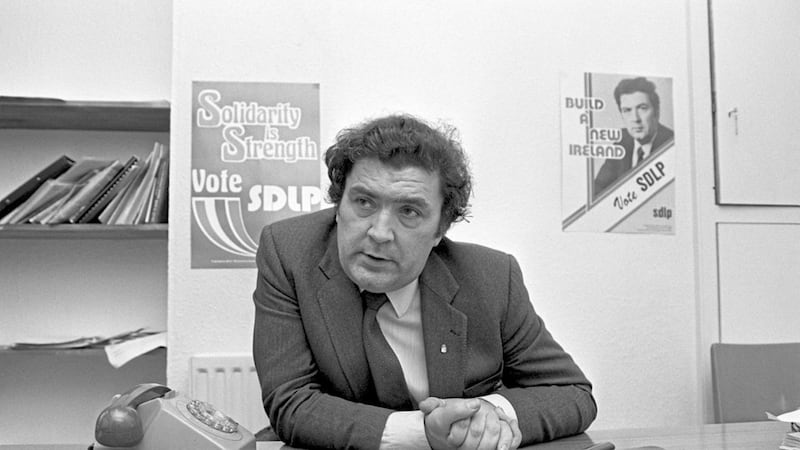UNIONISTS always had a bit of a problem with John Hume. They respected him for his consistent and unambiguous opposition to the IRA, yet couldn't shake off the belief that he wasn't really all that interested in any outcome other than a united Ireland.
Seamus Mallon described the Good Friday Agreement as Sunningdale for 'slow learners' but forgot to mention that Hume, then deputy leader of the SDLP, was key to the party's insistence on the inclusion of the Council of Ireland provision, even when it must have been obvious it was the specific issue which would galvanise unionism against the entire agreement.
Somewhere in the attic I have one of those 'Dublin is just a Sunningdale away' posters which the United Ulster Unionist Council (UUP, DUP and Vanguard) used in the February 1974 general election, when they got the overall majority- 51.1 per cent - they knew was required to kick-start the campaign which eventually toppled the Executive three months later.
A few weeks before he died I spoke to Brian Faulkner at an event and asked if there was a moment he knew Sunningdale might not survive.
He mentioned two: when the UUP rejected the agreement in January 1974, because of the Council of Ireland (he resigned as leader a few days later); and when he first saw the 'Sunningdale' posters being used by the UUUC.
'What if...' questions are usually impossible to answer. That said, I've often wondered what would have happened if the SDLP had set aside the Council of Ireland provision for a year or so to see if power-sharing would settle down.
It's likely that the UUP would not have rejected the agreement in January 1974 and the UUUC (assuming, of course, it had even been created) wouldn't have had the trump card which the Council of Ireland provided for the election a few weeks later.
A functioning Assembly would have made it more difficult for the IRA to continue with its campaign, whereas the combined forces of unionism being seen to topple power sharing acted as a fillip.
It's also likely that Sinn Féin would not have become the electoral force it became which, in turn, may have meant that Hume would never have had to have the 'talks' with Adams which eventually led to the SDLP being eclipsed by Sinn Féin.
History, as we know, didn't go in that direction. And even if the Council had been postponed for a while there's no guarantee that unionists would have accepted a version of it a year or two down the line.
The nature and steer of politics in Northern Ireland is that we tend to end up in the worst position because the intrinsic nature of what divides us makes genuine reconciliation impossible.
The problem with judging Hume's legacy is that there was so much still to be done. His vision is only half-fulfilled at best.
Ironically, the peace process post-1998 was probably more in need of his influence than the process leading up to the GFA.
But he was not in good health and his mental deterioration was swift and brutal. Within five years Sinn Féin had stormed past the SDLP and by the time Hume died the relationship between unionism and nationalism was almost as polarised as it had been in May 1974; and his concept of an 'agreed Ireland' had been replaced by Sinn Féin's 50-plus-one victory in a border poll approach.
Another 'what if' question. I wonder how things would have turned out if unionism had had a figure of Hume's significance and clout; someone who was able to influence policy and opinion in London, Dublin, Brussels and Washington?
The question is worth asking because, in reviewing Hume's political career, I have been struck by the quite startling fact that he had more influence in those political capitals than any unionist ever had.
That's both a tribute to his own skills and determination, and a reminder of unionism's continuing failure to promote a coherent message to counter his narrative - as well as the narrative trotted out by Gerry Adams who, with the death of Hume and Mallon, will now try and take possession of their efforts since the late 1960s.
I never got to know Hume well. But maybe the greatest tribute I can pay him is to say that I wish unionism had produced a leader with the same set of political skills.







